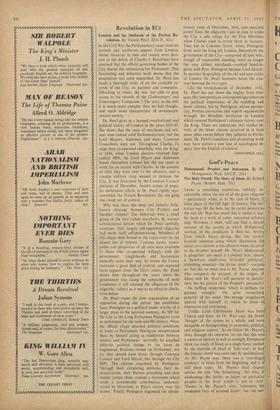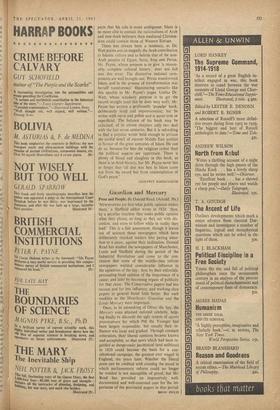God's Peace
THERE is something mysterious, unlikely, in- calculable, about the rise of all the great religions —particularly when, as in the case of-Islam, it,,' takes place in the full light of history. The his- torian may lift the hem, but he rarely penetrates the veil. Dr. Watt has much that is sound to say; his book is a work of sober, measured scholar- ship. Nowhere, I think, will one find a clearer account of the society in which Mohammed worked, of the conditions in Red Sea Arabia from which Islam sprang. But the careful Scottish common sense which illuminates the social environment is less effective when we come to the Prophet himself. Dr. Watt's Mohammed is altogether too much a Lowland Scot, almost a humdrum small-town revivalist politician; something essential—the divine spark?—escapes us. For this we must turn to Mr. Payne. Anyone who compares his account of the origins of Islam with Dr. Watt's will perceive its sketchi- ness; but his picture of the Prophet's personality —his baffling tenderness 'which is perhaps his greatest strength.' the quite astonishing polarity' of his mind, 'the strange imaginative quarrel with himself' in which he lived—is impressive and convincing.
Unlike Latin Christianity Islam was both Church and State. As Dr. Watt says, the Arabs 'thought of the system as a whole, and were incapable of distinguishing its economic, political and religious aspects.' As we follow Mr. Payne's story through the centuries. we see that this was a source of tension as well as strength. Europeans think too easily of Islam as a single force, unified by the doctrine of jihad or 'holy war'; in fact the Islamic world was soon rent by nationalisms. As Mr. Payne says, there was a 'centrifugal tendency' in Islam from the beginning, and it is still there today. Mr. Payne's final chapter carries the title 'The Awakening'; but what is awakening—the Arabs, or Islam, or particular peoples in the Arab world—is not so clear. Nasser, in Mr. Payne's view, 'represents the awakened fury of aroused Islam'; but one sus- pects that his role is more ambiguous. Islam is no more able to contain the nationalisms of Arab and non-Arab believers than medieval Christen- dom could contain those of Western Europe.
There has always been a tendency, as Dr. Watt points out, to magnify the Arab contribution to Islamic culture and to belittle that of the non- Arab peoples of Egypt, Syria, Iraq and Persia. Mi. Payne, whose purpose is to give 'a reason- ably complete cultural history,' does not fall into this error. The distinctive national com- ponents are well brought out; 'Persia transformed Islam, and in the process of transformation was herself transformed.' Illuminating remarks like this sparkle in Mr. Payne's pages. Unlike Dr. Watt, whose scholarly purpose is to get the record straight (and this he does very well). Mr. Payne has written a professedly 'popular' book, deliberately vivid and impressionistic; but he writes with verve and polish and is never trite or superficial. The balance of his book may he criticised; of its eleven chapters only two deal with the last seven centuries. But it is refreshing to find a popular writer bold enough to jettison the sordid detail of current Middle East politics in favour of the great centuries of Islam. He can do so, because for him the religious rather than the political aspects are uppermost. There is plenty of blood and slaughter in this book, as there is in Arab history; but Mr..Payne never lets us forget that 'all that was best in Islam came not from the sword but from contemplation of God's peace.'
GEOFFREY BARRACLOUGH















































 Previous page
Previous page